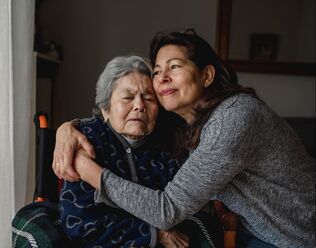By Nicole Ruggiano, PhD, MSW Driving is often seen as a symbol of freedom and independence, which is why many families struggle when they aren't sure if their older relative should still be behind the wheel. Many care partners find it stressful to even discuss issues of driving safety with their loved one. In some cases, care partners may be premature in wanting to take away their loved one's keys. In other situations, families do not have the conversation about their loved one driving until after the person has an accident. What should families do?
0 Comments
By: Dr. Nicole Ruggiano, PhD, MSW  May is mental health awareness month! One common mental health challenge that people living with dementia face is depression. Depression is a common condition for adults and can range in severity and duration. While depression is common among all adults, older adults with dementia are at greater risk of developing depression. According to the Alzheimer's Association, up to 40% of people with Alzheimer's disease will experience significant depression. This can cause stress for caregivers, who may not understand why their loved one has become depressed, not know what to do, and may even feel guilty that their loved one is suffering. Many often ask how to assess whether their loved one is depressed and what they can do to help them. My loved one was recently diagnosed with dementia. How can I help them in the early stages?1/21/2023 By: Nicole Ruggiano, PhD, MSW It is never easy for someone to receive a diagnosis of Alzheimer's disease or other type of dementia. In fact, research has shown that older adults are more afraid about dementia than they are afraid of cancer. It is normal for those who are diagnosed with dementia to experience a number of emotions, including fear about the future, anger, depression and denial. If your loved one has recently been diagnosed with a form of dementia and is having a hard time coping with their diagnosis, there are things that family and friends can do to help them in these early stages of their condition. By, Nicole Ruggiano, PhD, MSW Some time ago, I met a caregiver in Jefferson County named Mary who asked: How do I get my husband to stop giving out our banking information? Sometimes I catch him on the phone talking about our finances and I have no idea who he is talking to or how much information he gave out and it scares me. Oftentimes, one of the earliest signs that a loved one is developing dementia is when their difficulty in managing their finances becomes noticeable to others. For example, a person with dementia may be overspending to the point of financial instability. A person with dementia who is unable to manage the task of paying bills could have utilities cut off or large financial fees for late or missing payments. In other cases, like the one Mary was experiencing, a person with dementia may be at increased risk for financial exploitation or identity theft. As a result, many caregivers end up taking on the day-to-day finances for their loved one. Whether you are already managing you're loved one's finances or beginning to suspect that this task may be placed on you in the future, there are some things you should consider. By, Nicole Ruggiano, PhD, MSW Caregiving can be a time intensive activity, and caregiving needs can sometimes be unpredictable. That can pose a lot of challenges for caregivers, who are often also full-time workers and have other family responsibilities. Even though most caregivers are happy that they are able to care for their loved one, caregiving can still be exhausting. How often do you feel tired at the end of the day? You are not alone! According to a recent study by the National Alliance for Caregiving and AARP, among caregivers of older adults:
By, Nancy Kusmaul, PhD, MSW Caring for another person can be rewarding, challenging, and overwhelming . Many caregivers choose to care for family members and friends out of a sense of love, or paying someone back for care they have received earlier in life. But what happens when you can no longer provide that care? There are many reasons that you might not be able to continue caring at home. Family leave in the United States is limited, and you may not be able to take any more time off from work. Certain diagnoses, like dementia, can make it hard to provide care, especially if the person needs supervision around the clock for their own safety. Caregivers need to eat and sleep too, and it can be difficult to be “always on” to make sure that someone with dementia does not get hurt. And sometimes someone’s physical needs are just too much, and the caregiver cannot lift, or move, or provide care without great risk to both the caregiver and the person in need of care. If this sounds familiar, you have not failed. However, when we care for those we love, we also need to deal with their, and our, emotions and expectations. It is very common for loved ones to have asked to “never put me in a nursing home” or for family members to have promised not to do so. But sometimes that is just not possible. By, Lisa M. O'Neill, DBH, MPH A person living with dementia can experience pain, just like anyone else. Dementia does not cause pain, but a person living with dementia can be at risk for other things that cause pain such as falls or other injuries. Further, as with most older adults, people with dementia are more likely to have other medical conditions that might cause pain. However, it might be difficult for them to understand what you are asking or what they are feeling, so they may not be able to tell you if something hurts. Pain can come from multiple sources. It can be temporary, like a headache or sore throat. It can be longer lasting, like a sprained wrist or ankle. It can also be ongoing and persistent, like lower back or nerve pain. The source can also be symptoms of a known or new disease, or the treatment of a disease such as cancer. By, Bryan Ford, PhD, MSW Caring for another human being can be one of the most rewarding accomplishments of your life. It can also be very challenging and at times, overwhelming. It disrupts our lives, forces us to change our schedules and habits; just when we feel our lives are already busy enough. Yet, how you approach care planning can be just as important as what you do. Actively caring for another person has the potential to change your life in ways you never imagined. Caring for someone else is one of life's greatest teachers because you will learn much about yourself and those around you. Many caregivers put pressure on themselves to do everything "perfectly." This can often result in feelings of caregiver guilt. Don't feel that you have to be perfect, just do your best. The aim here is to improve the quality of you and your loved ones’ lives. If you are starting to develop a care plan, here are five areas that you should focus on: Health, Emotional, Legal, Portfolio (financial and insurance), and Social Issues (HELPS). These HELPS tasks are the gleaned from research to get you started. By, Hyunjin Noh, PhD, MSW Watching a loved one struggling with difficult pain can be a traumatic experience for caregivers and can have a negative impact on their mental health. Many caregivers are unaware about palliative care and how it can help them and their loved one. However, palliative care may be a health care option that benefits your loved one, you, and your family. What is palliative care?Palliative care is a special type of care for patients with chronic or serious illnesses, such as dementia, cancer, and kidney disease. The goal of these services are not to cure illness. Instead, it focuses on improving quality of life by preventing and managing pain and suffering. Palliative care supports the whole person, not just the illness. For instance, it helps with:
By, Nicole Ruggiano, PhD, MSW When caregivers tell me how much their loved one's dementia symptoms upset them, they are most upset when their spouse or parent does not recognize them anymore. I understand this first hand. When my grandmother's dementia became severe, she would become scared and upset when I visited her. She didn't know who I was anymore. To her, I was a stranger who entered her home uninvited. There was nothing I could say to make her understand that I was her granddaughter. I even pointed to photographs of me that were hanging in her apartment to show that she did, in fact, know me. However, this didn't help and she remained agitated and scared. While this was an emotional process for me, it is a common symptom for people with dementia and is a result of the changes to the brain caused by Alzheimer's disease or other type of dementia. |
Caregiving 101The Caregiving 101 is a resource for caregivers in Alabama who want to learn more about caregiving and dementia. Archives
August 2023
What would you like to learn more about?
All
|
205-348-4654

 RSS Feed
RSS Feed
